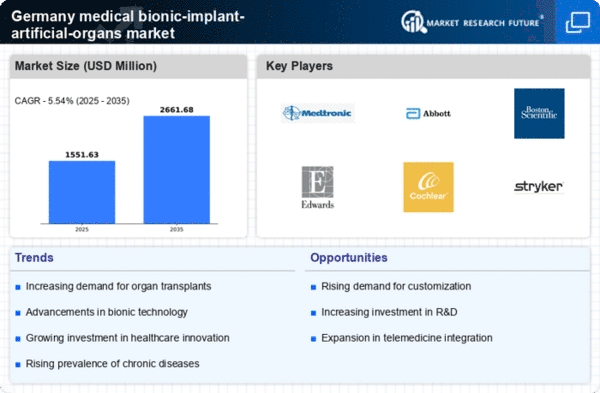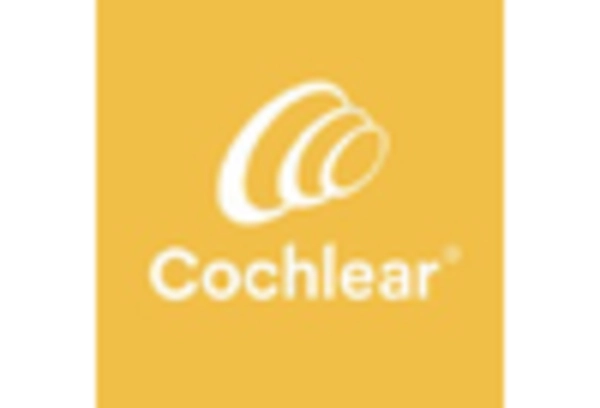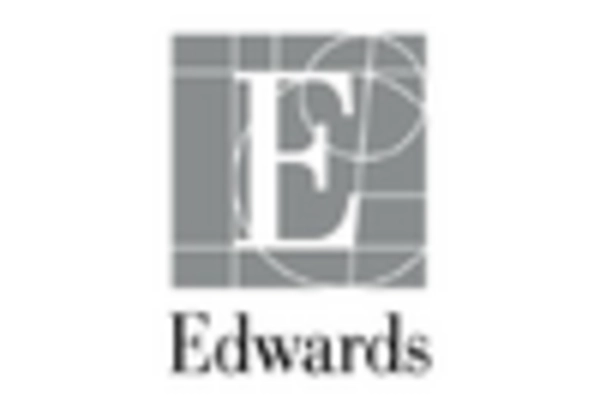Rising Healthcare Expenditure
The increasing healthcare expenditure in Germany is a pivotal driver for the medical bionic-implant-artificial-organs market. In recent years, healthcare spending has surged, with estimates indicating that it reached approximately €400 billion in 2025. This financial commitment reflects the government's focus on enhancing healthcare infrastructure and improving patient outcomes. As a result, investments in innovative medical technologies, including bionic implants and artificial organs, are likely to rise. The German healthcare system's emphasis on advanced medical solutions is expected to create a conducive environment for market growth. Furthermore, the willingness of patients to invest in cutting-edge treatments may also contribute to the expansion of the medical bionic-implant-artificial-organs market, as individuals seek improved quality of life through these advanced solutions.
Supportive Government Policies
Supportive government policies in Germany are playing a vital role in fostering the medical bionic-implant-artificial-organs market. The government has introduced various initiatives aimed at promoting research and development in the field of medical technology. Funding programs and grants are being allocated to support innovative projects that focus on bionic implants and artificial organs. Additionally, regulatory frameworks are being established to streamline the approval process for new medical devices, which may encourage manufacturers to invest in the development of advanced solutions. The proactive stance of the German government in facilitating a favorable environment for medical innovation is likely to stimulate growth in the medical bionic-implant-artificial-organs market, attracting both domestic and international players.
Increased Awareness of Organ Donation
Growing awareness regarding organ donation is emerging as a crucial driver for the medical bionic-implant-artificial-organs market. In Germany, public campaigns and educational initiatives have been implemented to promote the importance of organ donation. This heightened awareness may lead to an increase in the number of individuals opting for organ donation, thereby reducing the gap between supply and demand. As the need for organ transplants continues to rise, the medical bionic-implant-artificial-organs market could benefit from this trend. Moreover, the integration of bionic solutions as alternatives to traditional organ transplants may become more accepted, further enhancing the market's potential. The collaboration between healthcare providers and advocacy groups is likely to play a significant role in shaping public perception and acceptance of these innovative medical solutions.
Technological Integration in Healthcare
The integration of advanced technologies into healthcare practices is significantly influencing the medical bionic-implant-artificial-organs market. Innovations such as artificial intelligence, machine learning, and robotics are being increasingly adopted in medical settings. These technologies enhance the precision and effectiveness of bionic implants and artificial organs, leading to better patient outcomes. For instance, AI-driven diagnostics and robotic-assisted surgeries are becoming commonplace, which may improve the overall efficiency of medical procedures. The German healthcare sector's commitment to embracing these technological advancements suggests a promising future for the medical bionic-implant-artificial-organs market. As hospitals and clinics invest in state-of-the-art equipment, the demand for sophisticated bionic solutions is likely to escalate, further propelling market growth.
Growing Demand for Personalized Medicine
The increasing demand for personalized medicine is emerging as a significant driver for the medical bionic-implant-artificial-organs market. Patients are increasingly seeking tailored medical solutions that cater to their specific health needs. This trend is particularly evident in the field of bionic implants and artificial organs, where customization can lead to improved compatibility and functionality. In Germany, healthcare providers are beginning to adopt personalized approaches in treatment plans, which may enhance patient satisfaction and outcomes. As the medical community continues to recognize the benefits of personalized medicine, the demand for innovative bionic solutions is expected to rise. This shift towards individualized care could potentially reshape the landscape of the medical bionic-implant-artificial-organs market, leading to new opportunities for growth and development.
















